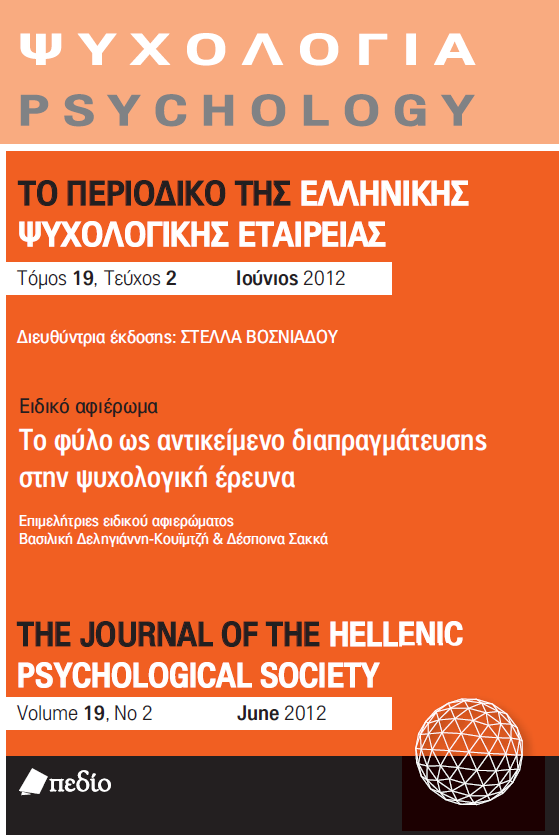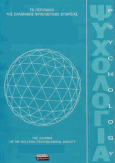Η εμπειρία της μαστεκτομής: ταυτότητα φύλου, ενσώματη ταυτότητα και “ζωή στο μεταίχμιο”

Περίληψη
Πέρα από μια απειλητική για τη ζωή ασθένεια, οι γυναίκες με καρκίνο του μαστού αντιμετωπίζουν σημαντικές προκλήσεις εξαιτίας των επιπτώσεων της ιατρικής θεραπείας στο σώμα και στην ενσώματη ταυτότητα τους. Η μαστεκτομή, ως μια ιδιαίτερα παρεμβατική στο σώμα θεραπεία φέρει σημαντικές επιπτώσεις στη ζωή των γυναικών. Η παρούσα έρευνα στοχεύει στη διερεύνηση της εμπειρίας της μαστεκτομής και των νοημάτων που οι γυναίκες αποδίδουν σε αυτή αναφορικά με την ταυτότητα και τις σχέσεις τους. Τα ερευνητικά ερωτήματα διερευνήθηκαν μέσα από τη φαινομενολογική προσέγγιση με στόχο την καλύτερη κατανόηση του ρόλου που διαδραματίζει το σώμα στην ασθένεια, ενώ υιοθετήθηκε η οπτική του φύλου, ώστε να εξεταστεί κριτικά το κοινωνικοπολιτισμικό πλαίσιο μέσα στο οποίο διαμορφώνεται η εμπειρία των γυναικών. Στην έρευνα συμμετείχαν δεκαεπτά γυναίκες, ηλικίας 26-57 ετών, που είχαν υποβληθεί σε μαστεκτομή μετά από διάγνωση καρκίνου του μαστού. Το υλικό που προέκυψε από τη διεξαγωγή ημιδομημένων συνεντεύξεων αναλύθηκε σύμφωνα με τις αρχές της φαινομενολογικής ανάλυσης. Η ανάλυση εμπλουτίστηκε από την οπτική του φύλου, καθώς δόθηκε ιδιαίτερη σημασία στην έμφυλη διάσταση της ενσώματης ταυτότητας. Τα ερευνητικά ευρήματα δείχνουν ότι κεντρικό στοιχείο της εμπειρίας της μαστεκτομής αποτελεί η αλλοίωση της ενσώματης ταυτότητας και μια αίσθηση μετεωρότητας, μιας ανεπίλυτης συνθήκης ύπαρξης ανάμεσα στη ζωή πριν και μετά τη διάγνωση. Η ανάλυση κατέδειξε την ανάγκη για διεύρυνση της έννοιας “της ζωής στο μεταίχμιο” στην ψυχο-ογκολογία προκειμένου να συμπεριλάβει την ασάφεια γύρω από τον αυτοπροσδιορισμό των γυναικών ως “φυσιολογικών γυναικών”, η οποία συνδέεται με την ενσώματη εμπειρία και τις κοινωνικοπολιτισμικές κατασκευές του γυναικείου στήθους. Ενδιαφέρον είναι, επίσης, ότι η “ζωή στο μεταίχμιο” γύρω από την γυναικεία ταυτότητα βιώνεται και από τις γυναίκες που χρησιμοποιούν επίθεμα σιλικόνης ή έχουν υποβληθεί σε επανορθωτική επέμβαση του στήθους. Τα ευρήματα εμπλουτίζουν τη θεωρητική κατανόηση της εμπειρίας της μαστεκτομής, διευρύνουν την έννοια της “ζωής στο μεταίχμιο”, αναδεικνύουν την έμφυλη διάσταση της ταυτότητας και τον ρόλο του κοινωνικοπολιτισμικού πλαισίου στη διαμόρφωση της εμπειρίας των γυναικών. Επιπλέον, προσφέρουν χρήσιμες κατευθύνσεις στον σχεδιασμό και στην παροχή εξατομικευμένης υποστήριξης σε γυναίκες που έχουν υποβληθεί σε μαστεκτομή.
Λεπτομέρειες άρθρου
- Πώς να δημιουργήσετε Αναφορές
-
Ζηλιασκοπούλου Δ., & Αυδή Ε. (2023). Η εμπειρία της μαστεκτομής: ταυτότητα φύλου, ενσώματη ταυτότητα και “ζωή στο μεταίχμιο”. Ψυχολογία: το περιοδικό της Ελληνικής Ψυχολογικής Εταιρείας, 28(1), 78–94. https://doi.org/10.12681/psy_hps.34680
- Ενότητα
- ΕΙΔΙΚΟ ΑΦΙΕΡΩΜΑ

Αυτή η εργασία είναι αδειοδοτημένη υπό το Creative Commons Attribution-ShareAlike 4.0 International License.
Το περιοδικό ΨΥΧΟΛΟΓΙΑ έχει υιοθετήσει μία πολιτική Platinum open-access. Τα έξοδα υποβολής, επεξεργασίας ή δημοσίευσης των εργασιών καλύπτονται από την Ελληνική Ψυχολογική Εταιρεία. Τα πνευματικά δικαιώματα των δημοσιευμένων εργασιών προστατεύονται από την άδεια 'Creative Commons Attribution-ShareAlike 4.0 International'. Οι Συγγραφείς διατηρούν τα Πνευματικά Δικαιώματα και χορηγούν στο περιοδικό το δικαίωμα της πρώτης δημοσίευσης. Η άδεια αυτή επιτρέπει σε τρίτους, να χρησιμοποιούν την εργασία σε οποιαδήποτε μορφή, με την προϋπόθεση της διατήρησης των διατυπώσεων που προβλέπονται στην άδεια σχετικά με την αναφορά στον αρχικό δημιουργό και την αρχική δημοσίευση στο περιοδικό ΨΥΧΟΛΟΓΙΑ. Επιπλέον, κάθε διανομή της εργασίας οφείλει να γίνεται με τους ίδιους όρους διανομής, δηλαδή με την ίδια άδεια Creative Commons.





